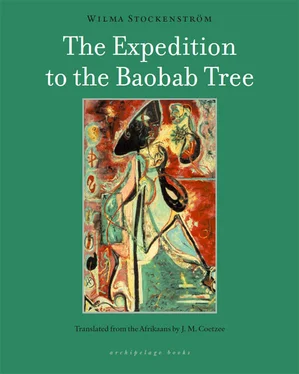So he must have found delight in me. So I must have afforded him pleasure. One evening he came to inquire about the condition of the chance patient in his care, and looked surprised when I laughed at the superstition about the kudu-berry tree, and drew me out on my short history, as self-contained and boring as the history of most of the slave girls in the city. In a brief and concise transaction he bought me, and my stay began in all humility in the high residence with the terrace roof built of stone from a far-off quarry, with a view over the low-lying city and the sea, with neat outbuildings and well-tended inner courtyards. My benefactor often summoned me. We spoke. The night came when he slept with me. He found me charming. More often than he had sexual intercourse with me, he ordered me to undress and simply talk to him quietly, while he kept looking at me as one views a pretty sunset or something like that. In the same way he looked at his son’s serval cat. When his bouts of fever came over him, only I was allowed to stay with him, and I sat and fanned him.
Fellow slaves of my second owner, who had stayed behind in misery — I had no chance to grieve for you. It had happened that the hurricane elected me. I was in agreement with what was befalling me. I hankered for nothing, I moped about nothing, I could not get excited about anything in my past, and in fact was unwilling to talk about it. It was wasted time. For I was becoming possessed with myself.
Now for the first time I discovered beauty, my own and that of bunches of flowers, and of soapstone statuettes and jade clasps and porcelain glaze, and of batiks dyed with indigo, and of lovely silk, light as a breath or heavy and stiff and interwoven with gold. It was almost as if I were learning again to talk. I occupied myself in refined tasks like complicated embroidery, which was taught to me by older slave women, and the preparation of dishes for a banquet for a roomful of visitors, and the tasteful serving thereof. In the last-named I excelled. I learned to converse quite differently, with a metallic tone of irony at the tail end of a remark. I learned to make my voice dove-sweet when the conversation became pointed and too many quick remarks, like slim arrowheads, were being shot off all together. I learned to laugh with abandon.
Above all I learned to find pleasure in how to look desirable and in the power it was obviously supposed I could exercise to my own advantage in my benefactor owner’s room. He gave me an ivory bracelet which fitted around my left upper arm and which I shamelessly showed off. Often I referred cattishly, when he was in the right mood, to the other slave girls’ most glaring defects: to thin calves, knobbly shoulders, missing teeth, breasts out of proportion, jutting chins, fingers as rough as a chimpanzee’s; and though he playfully agreed, and although he claimed that such shortcomings were limited and made little difference on the couch of pleasure, as he jokingly called his sleeping mat, I knew that what I had said remained in his thoughts. But I got only one bracelet from him.
Nevertheless. Nevertheless. My life shone. I hummed as I rubbed my skin with coconut oil. Only later did I find out that he had two kinds of slaves in service, one kind for their looks, the other kind for their readiness to serve.
So what was the source of melancholy that sometimes attacked me? As I looked out from the terrace over the sparkling bay and saw the dhows and skiffs wink there, as I looked over the roofs towards the haziness of the horizon and grew dulled with a stupid restlessness here within me and the screech of a gull frightened me, what were my hands doing in front of my face? What could I have to feel sorrowful about? Now that the fondness of my newest owner, wealthy widower and foremost citizen, like cool moss coolly and softly protected me and I felt cozily hidden in his care, not just feeling safe but surmising the sparkle of a new time of life for me here in the looser relationship in which I now lived and in which my talents dared to unfold and there was little to restrict me — why did the tears well up in my eyes and the city tremble in refracted colors? Why did my head sink on my chest? Why did I try to make myself as insignificant as possible, look for a dark corner, pretend absence when I was called?
I sat, tiny as a beetle, and whined. I was so full of held-in whining that I was ready to burst. I wished that I had a snout with which to burrow into the earth and disappear, or into the bark of a tree where I could lurk inconspicuously, pressed flat.
This was the mood I knew best. I knew it from long back. I have known it here, too, I admit honestly to you, trusty baobab, confidant, home, fort, water source, medicine chest, honey holder, my refuge, my last resort before a change of residence over which I shall have no control at all, my midpoint, guardian of my passionate outbursts, leafless coagulated obesity winter and summer life-giving rocking cupola of leaves and flowers and sour seeds that I press to my cheek (the grey-green fur strokes my skin), that I break open to roast your kernels and devour them, hanging like fulfillment from you, directed to the earth, waiting. You protect me. I revere you. That is to say, the fieldmouse and I inhabit you, but only I revere you, I think, only I.
If I could write, I would take up a porcupine quill and scratch your enormous belly full from top to bottom. I would clamber up as far as your branches and carve notches in your armpits to make you laugh. Big letters. Small letters. In a script full of lobes and curls, in circumambient lines I write round and round you, for I have so much to tell of a trip to a new horizon that became an expedition to a tree. Here comes a rhythmic pause. Oh, I have learned much from the poets, I am versed in the techniques, in the patching together of lyric and epic. Rhythmic pause and on roll the thoughts, round and round your trunk the poetic history of a crazy eagerness that was finally all we could cling to, stripped of material things and emaciated and tired to death of ourselves in the endeavor that transported us along, ballast of the past.
Thus I decorate you line after line with our hallucinations so that you can digest, outgrow, make smooth this ridiculousness, preserve the useless information in your thick skin till the day of your spontaneous combustion. And satisfied I put down the porcupine quill and stand back to regard my handiwork, hands on my hips. You are full of my scars, baobab. I did not know I had so many.
If I could write. Even then, melancholy would take possession of me. Wearily I take the path to the river, there in the cool to fill my being with the sounds of my sister-being, to refresh myself in the modest scents of pigeonwood and mitzeerie, to let my gaze end in a tangle of monkey ropes and fern arches and the slowly descending leaves, and to find rest, all day long, all night long.
There is always an ape to defile a sanctuary. How irritated I get when animals do not stay within the limits of their animal nature but want to address me on my level. For instance, the troop of samangos in the top of the water-berry tree. As if they were being sold short by me, as if I represented a great threat, as if I did not also belong, but had to be driven off with reproaches and deep warnings. Glare at me impudently indeed. Reprimand me indeed. Confront me and show disapproval indeed.
So too the grey parrot that my benefactor kept. Cool disapproval, ridicule, derision in the little eyes. If he wished you good morning he meant to push off, and the eyes became small as dots. He turned language inside out so that the meaning fell out and nothing could be said. He fouled his cage. He woke the whole household with his noise and challenged you when you hushed him with such a clear whistle that it split the air with its purity; and he, the prisoner, triumphed. That he with his puny bird intellect could learn how to triumph while I was plagued with depression, and acted uncertainly, and showed that I felt hurt, and defended myself with acrimony, said sneering things behind their backs about the two sons and one daughter who still lived in the house, made myself unloved among the slaves.
Читать дальше












